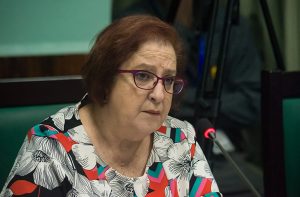…difficult to access carbon trading markets due to low deforestation – committee hears
GUYANA is not likely to significantly penetrate the Carbon Trading Market because its deforestation rate is extremely low, Guyana Forestry Commission (GFC) Head of Planning and Development Pradeepa Bholanath said.
Bholanath was part of a team of state officials led by the Head of the Office of Climate Change (OCC) Janelle Christian, who appeared before the Parliamentary Sectoral Committee on Foreign Relations on Friday at the Public Buildings.
Opposition Chief Whip Gail Teixeira, the Chairperson of that Parliamentary Sectoral Committee, had grilled the team on why Guyana is of the belief that the carbon trading market does not present viable opportunities for the country.
Carbon emissions trading is a common method countries use to meet their obligations specified by the Kyoto Protocol, namely, the reduction of carbon emissions in an attempt to reduce (mitigate) future climate change.

Teixeira in putting her question to the officials, pointed out that under the Forest Protection Agreement with Norway inked in 2009, Guyana over a period of five years, was set to benefit US$235M. “So this was ours, we owned it, we didn’t have to borrow money from anybody, we earned it,” the opposition chief whip emphasised, as she made a case for trading carbon under a model similar to that of the Low Carbon Development Strategy (LCDS). “Is the country’s failure to tap into this market an indication that we are shifting the policy?” Teixeira questioned.
Bholanath, in response, said that Norway back in 2009 had agreed to pay Guyana for avoided deforestation, once certain performance indicators are met, and not emissions reduction, which is in high demand on the global market.
“All the existing carbon trading markets that have been out there internationally as well as regionally are paying for emissions reduction. Now for a country with high forest cover and low deforestation rate, it really means that unless we start to rapidly deforest like Brazil and other countries around the world that have shown high levels of deforestation rate, it really would be a non-starter for us to target those markets,” Bholanath explained.
The GFC official emphasised that because the country’s deforestation rate is low, it does not have a substantial amount of carbon emissions to reduce. “The only option we would have to reduce anything substantial to be able to be an active part of these markets would be if we start to ramp up deforestation rates,” she added.
Bholanath had, in her presentation to the Parliamentary Sectoral Committee, pointed out that the Lowest Rate for Annual Assessments reported as 0.05 per cent in 2015 and 2016. It was noted that all forest concessions previously issued under the 4th parallel have now reverted to the Forestry Commission, and is now available to be part of the 2 million hectare conservation area.
Ahead of Bholanath’s presentation, OCC Head Janelle Christian, while presenting on “The Paris Agreement – Progress on Implementation of Guyana’s Nationally Determined Contributions (NDC),” had pointed out that the Paris Agreement Rule Book is being crafted and when completed, would act as a guide to effectively facilitate carbon emissions trading.
Christian told the parliamentarian that Guyana has been taking stringent steps to fulfil its commitment under the Paris Agreement, simultaneously addressing its vulnerability and increasing its resilience.
It was noted that the Low Carbon Development Strategy (LCDS) is now being transitioned into the Green State Development Strategy (GSDS), which places emphasis on low emissions and decarbonised development across all sectors.
As the country advances its National Strategic Initiatives on Climate Change focus, it is working with key partners such as the Caribbean Development Bank (CDB) to develop a National Climate Change Policy, a Strategic Plan for the OCC and a National Climate Change Communication Strategy and Implementation Plan.

“The Office of Climate Change has been able to mobilise resources from the CDB for the preparation for a new National Climate Change Policy. We have advanced this process, and the contract is pending no-objection at the National Procurement and Tender Administration Board, likewise, the CDB has provided the resource for the preparation for the strategic plan for the Office of Climate Change. This contract is also pending no- objection at the National Procurement and Tender Administration Board,” she reported.
The CDB is also financing the National Climate Change Communication Strategy and Implementation Plan.
With funding from the Government of Japan, and support from the United Nations Development Programme (UNDP), Guyana is preparing a National Adaptation Plan. The contract was signed approximately two weeks ago according to the UNDP, and a team is expected in Guyana in October.
She also updated the Parliamentary Sectoral Committee on the Green Climate Fund initiatives. The Green Climate Fund is financed by developed countries to assist poor and developing countries to address their climate-change related issues.
Guyana is among developing countries benefiting from this fund. “Guyana was among the first CARICOM countries to access the readiness support under the Green Climate Fund for strengthening of the National Designated Authority (NDA)…This first NDA strengthening project would have built our capacity, helping us to understand the framework modality for accessing resources through the GCF and it also helps us to identify our priority and prepare what is called the country’s work programme for accessing resources,” the OCC head explained.
In June, the OCC received approval from the GCF for readiness support to the amount of $697,000US to address capacity-building and readiness within the agriculture sector. The United Nations Food and Agriculture Organisation (UNFAO) is assisting in this process.
GUYANA signed onto the Paris Agreement on Climate Change in 2016. The Paris Agreement is an agreement within the United Nations Framework Convention on Climate Change (UNFCCC), which deals with greenhouse gas emissions mitigation, adaptation and finance, starting in the year 2020.





.jpg)








